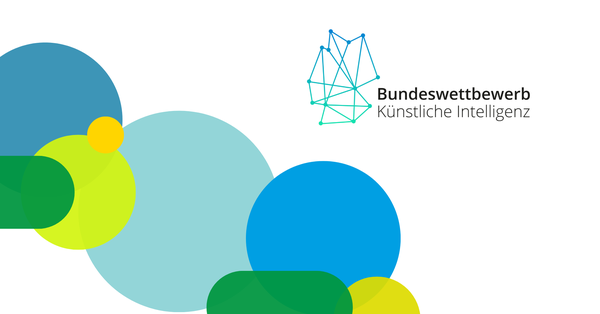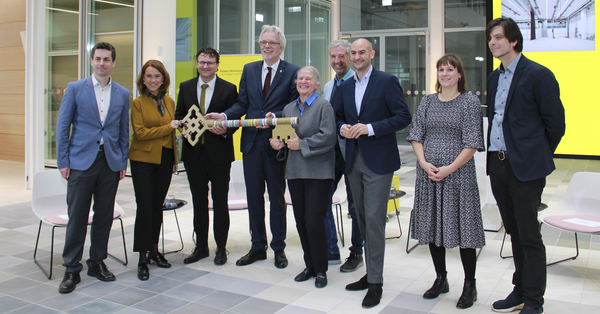Communicate and inspire
With Auguste Schulz, AI makes its way to schools

“Machine learning and artificial intelligence are influencing our lives. Today – and even more so in the future,” Auguste Schulz notes. “People should understand this and reflect on it critically.” The idea behind the “KI macht Schule” (AI in school) initiative is that you can’t start early enough. It brings the discussion about artificial intelligence (AI) into secondary schools and gives students their first practical experience with the technologies and systems behind it.
Together with eight other students and doctoral students, Schulz founded and coordinates the Tübingen local group of the nationwide project. As a team, they offer small workshops to students in grades 9 and up, which essentially have three components: First, Schulz and her colleagues give a brief introduction to a subarea of AI – for example, an image analysis system that can recognize and analyze faces. This technology is then used in a second step by the students to configure their own application that, for example, recognizes whether the people in selected pictures are wearing masks.
At the end, the students reflect on the examples they have worked on before. “You have to try out technologies yourself in order to really understand them. And only when you have understood them properly can you deal with them consciously,” Schulz emphasizes. So, questions are discussed such as: What happens when someone wears glasses? What about people with different skin colors? How important is it that such intelligent systems are trained with the right data?
Cyber Valley and the common mission
Questions like these are also what drive Schulz beyond the core of her own research. And they connect her with the AI research consortium Cyber Valley. Because initiating social-ethical questions and discussions and thus contributing to the dialogue between researchers and society on the topics of AI and machine learning is a task that the Cyber Valley Public Engagement Team is happy to support.
“AI systems and machine learning are so prevalent in our society that it’s just important to talk about these issues and engage with society,” Schulz says. The school workshops are a good example of how this can work. Because there the exchange is not a one-way street. Auguste Schulz also takes a lot away from the interaction with the pupils. “It’s really interesting that the students ask questions and don’t let up. Then you realize how well I really understood the topic myself,” says Auguste, whose enthusiasm for this exchange is plain to see.
From physicist to physicist
The doctoral student is particularly keen to attract children to scientific and technical subjects, the so-called STEM subjects. Especially children who have perhaps not yet thought about a career in science or technology – or who do not yet have the confidence to do so. Schulz, who studied physics herself, wants to show them that there are also female researchers in these fields. “You still sometimes stand out as a woman in your studies. Or you are often spoken to about the fact that you don’t really look like a physicist,” Schulz notes. That’s why it’s so important to break such thought patterns as early as possible – even before choosing a course of study.
“It’s always hard to see yourself as a role model,” Schulz says. “But I can talk about my experiences. And just recently I met a young student who was very happy to meet a physicist for once.”
Encourage exchange
With her infectious enthusiasm, Auguste Schulz not only wins over students for herself and the topic of AI, she also shares it with colleagues from very different research fields. This collaboration across disciplinary boundaries is another focus for which Schulz finds support in Cyber Valley.
For Auguste Schulz, interdisciplinary work already began during her physics studies at the University of Heidelberg. During her year abroad in England, she discovered her fascination for neurotechnology, which studies the nervous system and brain activity. Because that is simply more exciting than particle physics, Schulz says with a laugh. A Master’s degree in neuro engineering followed in Munich and then the aforementioned move to Tübingen, where she found a network of many like-minded people in very different research groups in Cyber Valley.
“We are all united by our desire to develop new statistical methods and use machine learning to learn something from all the scientific data that is being ingested,” says Schulz, describing the bond in Cyber Valley.
Brave new statistical worlds
As part of her doctoral thesis, Schulz is currently researching the connections between brain activity and animal behavior. She is investigating what happens in our brain while animals exhibit a certain behavior – and which neuronal activity enables which behavior. Today’s behavior, for example, is also influenced by past behavior.
If you want to explore and map these relationships, you are confronted with huge amounts of data. Normal static methods reach their limits here. Schulz therefore uses machine learning methods to extract as much as possible from these complex data. And to help the neuroscientists with whom she is working on the project to gain new insights.
The overarching goal of Schulz’s work is to use machine learning, to develop new methods in exchange with colleagues from other disciplines, and then to make these methods usable for a whole range of other applications. For instead of brain data, health data, climate data or data from quantum physics can just as well be better analyzed in this way.
Wishes for the future
And it is precisely this collaboration and cooperation with other disciplines that Auguste Schulz finds particularly enriching. So, it’s hardly surprising what she would like to see in the future in the Cyber Valley network: “The support here is already great. But I would like to see even more interaction and exchange, especially after the pandemic. On campus in bars or cafés, but also in many new initiatives by researchers and students.” So that it will also be easy for new young researchers to arrive here in the future, to find an exciting research climate and to enter into dialogue with society.
Video
Related Articles

School pupils compete in the Federal Competition for Arti...

